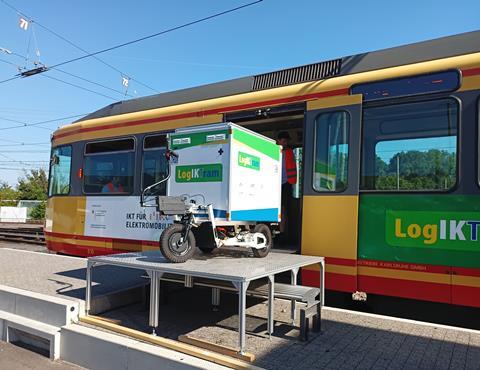
GERMANY: Small volumes of freight can be handled on urban rail networks using freight trams or similar vehicles, a research project conducted in Karlsruhe has concluded.
The LogIKTram scheme, which is closely linked to the regioKArgo project launched in August 2020, drew to a close this summer with a live demonstration of a prototype freight tram fitted out to accommodate bicycle trailers.
A fundamental element in the project was automation of some of the logistics processes using an information and communications technology platform designed for use with freight trams. In the demonstration, an electrically powered bicycle drove independently into the tram’s designated cargo area. In commercial operation, the project promoters envisage that the electrically powered trailer would be taken over for the final leg of its journey by a cycle courier.
For carriage of goods or parcels in lower volumes, a load carrier the size of a Euro pallet would be used. Larger loads would be carried in swapbodies suitable for transfer between carrier wagons and lorries.
Underpinning the demonstration project was a booking tool developed by Marlo Consultants GmbH which allows bookings for use of a freight tram to be made directly via a customer’s transport management system. A standardised transport implementation plan is created from the booking form, and this is used as the basis for the traffic control and monitoring process; this can be updated in the event that a diversion is required.
The booking tool makes use of the latest data standards from European research projects, which have already been proven in urban logistics projects in the Netherlands.
The project was co-ordinated by Albtal Verkehrs-Gesellschaft. Partners in the project were the FZI Research Centre for Information Technology, Offenburg University of Applied Sciences, INIT GmbH, Karlsruhe Institute of Technology, Marlo Consultants GmbH, SimPlan AG and DB Engineering & Consulting GmbH.
Associated partners were AEN-Automotive Engineering Network, e-mobil BW GmbH, Hitachi Rail, the city of Karlsruhe, TechnologieRegion Karlsruhe GmbH, Verkehrsbetriebe Karlsruhe GmbH and Dachser DPD. Funding was provided by the Federal Ministry of Economics & Climate Protection.



